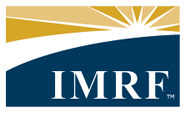Joy R. G. of Lake County, IL
As we celebrate our 75th anniversary, we also celebrate the workers who make IMRF possible. In this recurring feature, active members of IMRF tell us in their own words a little about how they serve their communities and the state of Illinois.
Joy R.-G. has worked for the Lake County Health Department as a Service Coordinator in the Early Intervention program since May 2004. She coordinates services for families who have children with developmental delays from birth to age 3.
Joining the Program
Many times parents and children come to us through a doctor's office. Other times they know about us already—maybe they had a previous child in the program, or they knew someone else who was in the program, or they went searching on the internet. I may with work with children who have anything from a speech delay to a diagnosed condition.
During my first meeting with a family, my job is to explain the program, while gathering information not just about the child, but about the entire family, and how their concerns about their child's development affect their routines. I will then coordinate with a team to do the initial evaluations to see if the child is eligible for Early Intervention services. These evaluations will give us information on all developmental domains (physical, communication, adaptive, cognitive and social/emotional). If the child has an automatic eligible diagnosis (developmental delays such as Down Syndrome, birth weight under 2.2 pounds, etc.) or is found to have a significant delay in one or more areas of development, then the child is eligible for Early Intervention.
Once eligibility is determined, the evaluating team, family and myself will hold a meeting to formulate outcomes—what they want to see their child doing that they're not doing, and how their routines would be enhanced if their child was doing what they want. Strategies are added to each outcome; these are activities that will be done by the family to help their child achieve the desired outcome. A lot of these activities will be something only a therapist can teach them.
With this information, we will then discuss which services, at what frequency, are needed to support the family to achieve the desired outcomes. We recommend services, and if the family accepts these services, then my job is to find them the service providers. The services take place in their home.
A Family-Centered Approach
All the services are about teaching the family what to do to help the child, as opposed to bringing in more and more therapy to "fix" the child. It all comes from the family. The therapist should show the family how to do it and then have the family show them what they're learning so they feel comfortable doing it between sessions. It's really important that the family do all this carryover, or no amount of therapy each week will make any kind of change.
It's super rewarding when a child comes into the program and they don't need us in a year, or they don't need us in less than a year, because the family has learned what to do, and has carried through.
Transitioning to School
If they are with us longer, when they're turning 3, you get to see all the change the family has gone through, and what they've learned, and how they now can advocate for their child. After age 3 they're not with us anymore, so it's really important for the family to learn that.
We start the process of transitioning the child from Early Intervention to the Early Childhood program provided by their school district starting at age 27 months, so that the child will start services on their third birthday, no matter where their birthday lies. The child is evaluated through their local school district to see if they have any educational needs, and then they have a meeting to discuss the needs and write a plan of services. I go to those meetings as a support to the family, but also because we (the therapists who have worked with the child and myself) have this previous knowledge of the child. Seeing a family go through that scary process, and they're not just sitting there listening, but they're talking—that is very rewarding. That means that we've taught them how to advocate.
One Family's Journey
When I was brand new in the program, I got a referral for a child who was just about starting to walk when he got meningitis. He had all four limbs amputated above the elbow and knee joints. Meningitis does a lot to the learning processes of your brain, too, and so the prognosis was terrible. I was thinking, "Oh my gosh, what's this first meeting going to be like?" But the family's attitude was, "we want to know what to do for our child, and we're going to make a change; this is not going to be what the doctor said."
He's way beyond our program at this point, but every once in a while I meet with the physical therapist for another kid, who also happens to be the physical therapist for this child (working privately with this family still to this day), and she'll say, "Remember our kid?" and I always know who she's talking about, and she always tells me something he's doing. It's just wonderful to hear. Did they ever show me what faith meant and a belief in their own family and their abilities. They just needed to learn, and they were completely open to that.


